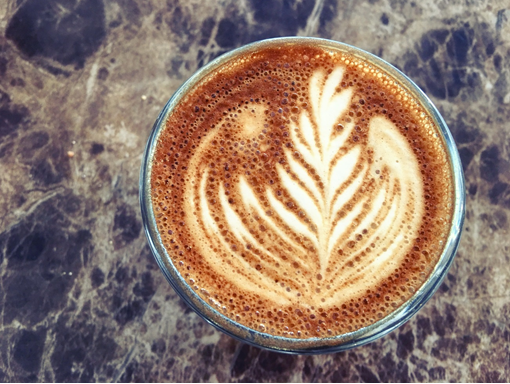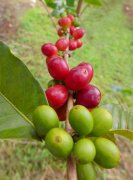Characteristics of Kenyan PB coffee beans Kenyan PB coffee drinking method

For professional baristas, please follow the coffee workshop (Wechat official account cafe_style)
Now I would like to introduce PB's full name Peaberry, which is what we often call round beans. Usually there are two seeds in a coffee fruit, that is, our common coffee beans, one side is curved, the other is flat, similar to peanut shape, we call it flat beans; round beans are only one coffee bean in a coffee fruit, and the shape of the bean is oval, accounting for a very small proportion in the fruit of the whole coffee tree. Round beans are selected artificially, and the overall quality is guaranteed, so it is not surprising that they taste good.
The hands of Kenya. 15g powder, medium fineness grinding (small Fuji ghost tooth cutter 3.5grinding), v60 filter cup, 91mi 93 degrees water temperature, first water injection 30g water, carry on steaming for 27 seconds, injection to 105g water cut off, wait for powder bed water to half, then water injection, slow water injection until 225g water volume, no water powder ratio at 1:15, extraction time at 2:00
Factory name: coffee factory address: Guangzhou Yuexiu District Baoan Qianjie 10 Qianjie Cafe manufacturer contact Information: 020-38364473 shelf life: 90 net content: 227g Packaging: raw and ripe degree of bulk coffee beans: whether coffee beans contain sugar: sugar-free origin: Kenya baking degree: light roasting
Kenya Nyeri Gaturiri Peaberry
Country: Kenya
Grade: TOP PB
Production area: Nyeri
Baking degree: shallow baking
Treatment: washing
Variety: SL 28, SL 34
Processing plant: Chakney processing plant
Flavor: black plum, green grape, small tomato
Brief introduction of Kenya Nyeri Thagrini Peaberry Farm
A bourbon line screened and cultivated by French and British missionaries and researchers in Kenya at the beginning of the 20th century. Over the past hundred years, it has adapted to the high concentration of phosphate soil in Kenya, giving birth to the special sour and fragrant spirit of Kenyan beans, which is different from bourbon beans in Central and South America. This Kenyan native species was created by Scott Laboratories in 1930, known as SL for short. Agronomists wanted to find a kind of bourbon with high yield and resistance to diseases and insect pests, and obtained SL28 through experiments. SL28 is a genetic variant with a mixed pedigree of French missionaries, mocha and Yemeni Tibica. The goal of breeding SL28 was to mass-produce coffee beans with high quality and resistance to diseases and insect pests. Although the yield of SL28 was not as high as expected the copper leaf color and broad bean-shaped beans have great sweetness balance and complex flavor as well as significant citrus and black plum characteristics. This important variety leads us to the unique Kenyan style: strong acidity, rich taste and beautiful balance. Kenya AA is one of them.
SL28 is a delicious variety, suitable for growing in the middle and high altitude areas where leaf rust is not serious. It can produce 1.8 tons of raw beans per hectare and drink the charming sour plum flavor to reflect the national treasure of Kenya.
Many people are familiar with the Kenyan AA is the most common symbol of Kenyan coffee in the country, in fact, AA is a grade of Kenyan coffee, lower than AB, and above it are AA+, AA TOP (top). If you only label AA for coffee beans, generally it can only show that the coffee is AA grade, there is no specific farm or cooperative, the flavor may not be the best, it can only show that its beans are neatly up to the standard and sell well. And it is written on the label that specific farms or cooperatives or even purchasers, then this bean, whether AA or AB, is worth a try.
Kenya, located in East Africa, is one of the major coffee producing countries. More than 6 million people in the country are engaged in the coffee industry, mostly in the form of a combination of small farmers and cooperatives. Coffee trees in Kenya are mostly planted at 1400 m-2000 m above sea level, and the growth areas include Ruiri, Thika, Kirinyaga and Mt. Kenya West, Nyeri, Kiambu and Muranga. Mainly in the foothills of Mt.Kenya and Aberdare. There are many producing areas in Kenya that strive to preserve the native forest ecosystem, protect the natural gene pool, support the reproduction of wild coffee varieties and breed a variety of coffee trees.
Brief introduction of producing area:
The raw bean comes from the Chakney processing plant in Neri and comes from a nearby family farm. About 2023 coffee trees are planted on half an acre (about 250 square meters) of land. Neri has always been a classic coffee producing area in Kenya, relying on Mount Kenya, with a favorable environment for coffee growth. Most Kenyan coffee comes from about 65 per cent of small farmers and 35 per cent of large farms.
Flavor: classic Kenyan flavor, rich, high mellow, caramel, blackcurrant, apple, pure, long, full-bodied tropical fruit and fresh citrus aromas, sweet taste as if the mouth contains mango, plum and other preserves, medium and low temperature emitting the refreshing smell of lime, like drinking frozen fruit tea! Very personalized little tomato flavor! Full of the passionate and unrestrained flavor of African beans!
Important Notice :
前街咖啡 FrontStreet Coffee has moved to new addredd:
FrontStreet Coffee Address: 315,Donghua East Road,GuangZhou
Tel:020 38364473
- Prev

Taste and flavor of Kenyan PB coffee characteristics of Kenyan PB
Professional barista communication please follow coffee workshop (Wechat official account cafe_style) factory name: coffee workshop address: Guangzhou Yuexiu District Baoan Qianjie 10 Qianjie Cafe manufacturer contact Information: 20-38364473 shelf life: 90 net content: 227g packaging: bulk coffee beans ripe degree: coffee cooked beans sugar-free origin: Kenya roasting degree: light roasting K
- Next

How Much Is Kenya's PB Coffee?
Professional barista communication, please pay attention to coffee workshop (Weixin Official Accounts cafe_style ) production area introduction: This raw bean comes from the Chakni processing plant in Neri, produced from the surrounding family farm, about 250 coffee trees are planted on 0.5 acres (about 2023 square meters) of land. Neri has always been a classic coffee producing area in Kenya. Relying on Mount Kenya, Neri has the advantages suitable for coffee growth.
Related
- Detailed explanation of Jadeite planting Land in Panamanian Jadeite Manor introduction to the grading system of Jadeite competitive bidding, Red bid, Green bid and Rose Summer
- Story of Coffee planting in Brenka region of Costa Rica Stonehenge Manor anaerobic heavy honey treatment of flavor mouth
- What's on the barrel of Blue Mountain Coffee beans?
- Can American coffee also pull flowers? How to use hot American style to pull out a good-looking pattern?
- Can you make a cold extract with coffee beans? What is the right proportion for cold-extracted coffee formula?
- Indonesian PWN Gold Mandrine Coffee Origin Features Flavor How to Chong? Mandolin coffee is American.
- A brief introduction to the flavor characteristics of Brazilian yellow bourbon coffee beans
- What is the effect of different water quality on the flavor of cold-extracted coffee? What kind of water is best for brewing coffee?
- Why do you think of Rose Summer whenever you mention Panamanian coffee?
- Introduction to the characteristics of authentic blue mountain coffee bean producing areas? What is the CIB Coffee Authority in Jamaica?

